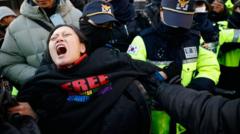The South Korean political landscape is in turmoil as authorities struggle to arrest suspended President Yoon Suk Yeol. Despite the presence of over 100 police officers armed with a warrant, an attempt to detain him outside his residence in Seoul recently ended in a six-hour standoff. Yoon, who is facing a slew of criminal charges stemming from his controversial martial law order and an ongoing impeachment process, was supported by a large contingent of loyalists who blocked police access to him.
According to local reports, Yoon's presidential security service (PSS) played a critical role in obstructing the arrest, demonstrating intense loyalty to their former leader. Experts suggest that the PSS might be acting under the belief that their allegiance is more towards Yoon personally rather than to the president's office itself. Concerns have arisen that Yoon might have strategically placed loyalists within the PSS to mitigate the impact of any potential fallout from his political missteps.
Political analysts indicate that acting President Choi Sang-mok could alleviate the deadlock by instructing the PSS to step aside, but he has yet to do so. This inaction has raised questions about his capability as interim leader and may even put him at risk of impeachment should he continue to falter. Choi was placed in power after Yoon’s initial successor was also impeached, underscoring the current political chaos.
Public opinion is notably polarized; while a majority have condemned Yoon's actions, there's a lack of consensus on the path forward. Duyeon Kim, a senior fellow at the Center for a New American Security, pointed out that societal disagreement regarding legal processes and expectations for accountability adds to the prevailing uncertainty. The tensions have sparked confrontations outside Yoon's residence, where supporters have held their ground amidst the chaos.
Should police decide to return with additional forces, it may escalate the situation significantly, as the PSS is heavily armed. The avoidance of confrontation remains a top priority for law enforcement agencies as they navigate complex political circumstances.
As of now, the timeline is of paramount importance; authorities have until early January to execute an arrest before the existing warrant expires. If unsuccessful, they may attempt to secure an additional warrant. The forthcoming days are likely to test the resilience of South Korean democracy, as the unpredictable political environment continues to evolve with potential implications for national stability and governance.
According to local reports, Yoon's presidential security service (PSS) played a critical role in obstructing the arrest, demonstrating intense loyalty to their former leader. Experts suggest that the PSS might be acting under the belief that their allegiance is more towards Yoon personally rather than to the president's office itself. Concerns have arisen that Yoon might have strategically placed loyalists within the PSS to mitigate the impact of any potential fallout from his political missteps.
Political analysts indicate that acting President Choi Sang-mok could alleviate the deadlock by instructing the PSS to step aside, but he has yet to do so. This inaction has raised questions about his capability as interim leader and may even put him at risk of impeachment should he continue to falter. Choi was placed in power after Yoon’s initial successor was also impeached, underscoring the current political chaos.
Public opinion is notably polarized; while a majority have condemned Yoon's actions, there's a lack of consensus on the path forward. Duyeon Kim, a senior fellow at the Center for a New American Security, pointed out that societal disagreement regarding legal processes and expectations for accountability adds to the prevailing uncertainty. The tensions have sparked confrontations outside Yoon's residence, where supporters have held their ground amidst the chaos.
Should police decide to return with additional forces, it may escalate the situation significantly, as the PSS is heavily armed. The avoidance of confrontation remains a top priority for law enforcement agencies as they navigate complex political circumstances.
As of now, the timeline is of paramount importance; authorities have until early January to execute an arrest before the existing warrant expires. If unsuccessful, they may attempt to secure an additional warrant. The forthcoming days are likely to test the resilience of South Korean democracy, as the unpredictable political environment continues to evolve with potential implications for national stability and governance.



















